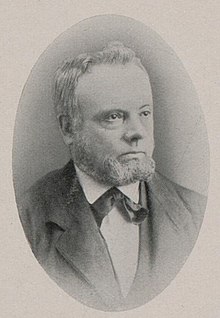Heinrich Julius Holtzmann

Heinrich Julius Holtzmann (7 May 1832 – 4 August 1910),
Evangelical State Church in Baden.[1]
Biography
He studied at
Berlin, and eventually (1874) was appointed professor ordinarius at the University of Strasbourg (rector in 1878/79). A moderately liberal theologian, he became best known as a New Testament critic and exegete, being the author of "Die Synoptiker" (Commentary on the Synoptics; 1889; 3rd ed., 1901), the "Evangelium, Briefe und Offenbarung des Johannes" (Johannine books; 1890; 2nd ed., 1893), and the "Apostelgeschichte" (Acts of the Apostles; 3rd ed., 1901), in the series "Handkommentar zum Neuen Testament".[1][2]
On the question of the relationship of the
Matthew in its present form from Mark and from Matthew's earlier "collection of sayings", the Logia of Papias, and Luke from Matthew and Mark in the form in which we have them.[1] This view was a modified version of Christian Weisse
's hypothesis.
Other noteworthy works are:[1]
- Lehrbuch der historisch-kritischen Einleitung in das Neue Testament (1885, 3rd ed., 1892).
- Lehrbuch der neutestamentlichen Theologie (2 volumes, 1896–97).
- Lexikon für Theologie und Kirchenwesen (1882; 3rd ed., 1895); in collaboration with Richard Otto Zöpffel.[4]
In 1893 he became editor of the "Theologischer Jahresbericht". Holtzmann died in Baden-Baden-Lichtental.
Family
He married the daughter of Georg Weber. His daughter Adelheid (1866–1925) was a politician and women's rights activist. She married Gustav Steinmann.
References
- Holtzmann, Heinrich In: ISBN 3-428-00190-7, S. 560 f.
Attribution:
- This article incorporates text from a publication now in the public domain: Chisholm, Hugh, ed. (1911). "Holtzmann, Heinrich Julius". Encyclopædia Britannica. Vol. 13 (11th ed.). Cambridge University Press. p. 620.
- ^ a b c d Chisholm 1911.
- ^ Catalogue of the Library of the American School for Oriental Study by Albert Ten Eyck Olmstead
- ISBN 9780790511580.
- ^ Most widely held works by Heinrich Julius Holtzmann WorldCat Identities
